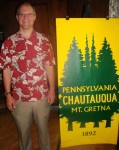Last week, Edward B. (“Ted”) Davis, Distinguished Professor of the History of Science at Messiah College (Grantham, PA) and outgoing president of the American Scientific Affiliation (ASA), shared with us how he became interested in History of Science and some tips for Emerging Scholars as they seek academic positions. In this second post, we explore recommended resources for those interested in the History of Science. Let's get started ’ Thomas B. Grosh IV [TG]: For members of ESN with an interest in History of … [Read more...] about History of Science Recommendations from Ted Davis
